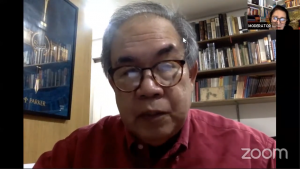Last May 11, the UP System GE Conference 2021 came into a conclusion with two plenary sessions scheduled for the morning and the afternoon.
The first plenary sessions discussed the importance and relevance of GE through speeches by eminent set of speakers — University Professor and Professor Emeritus Gemino H. Abad, Professor Emeritus Jose Y. Dalisay Jr., Professor Emeritus Michael L. Tan, as well as UP Diliman Chancellor and Professor Fidel R. Nemenzo.
During the first plenary session, they delved into the importance of teaching GE courses and its timely relevance to the Filipino society. They also talked about the intersectionality and interdisciplinarity in teaching GE courses. The first speaker was Professor Emeritus Jose Y. Dalisay Jr., who imparted 12 life lessons from GE courses:
12 Life Lessons from GE Courses

Good morning. There are many discussions of the learning outcomes we expect to produce in general education, and typically, the experts in this field—a category to which I surely don’t belong will say that they include Intellectual and Practical Skills, Civic and Global Leadership, Knowledge of Human Cultures, and Understanding the Physical and Natural World. As one university puts it, GE is meant to develop “informed people who have the ability to act thoughtfully in society, to make critical judgments, and to enjoy a life dedicated to learning and the pleasures of intellectual and artistic pursuits.”
We can all make similar formulations and they will probably be all correct and useful. This morning, however, not being an educational theorist, I’d like to talk about some practical expectations or realizations that I would like my students to come out of GE with.
I don’t know how these can be formally integrated into syllabi, and maybe they shouldn’t be. Rather, they’re overarching notions, a kind of wish list of what I as a teacher wish my students learn from my classes.
I’m phrasing these 12 statements as simply as possible, without too many elaborations, because I don’t want this to sound like an article. Rather, think of these statements as provocations that you and your students can wrangle with. And at the end of this very short talk, the workshop organizers can upload this in the chat as a file. So here we go:
1. You don’t have to understand everything right away. In any case, you can’t. Some things in life will forever remain mysteries—some of them wonderful, some of them perplexing. Staying curious is what matters to the lifelong learner.
